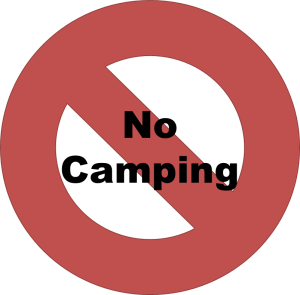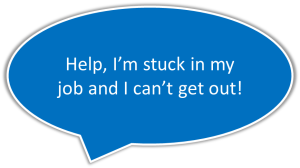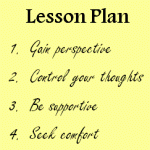Tag: choices
What we do for money
 I was talking to a friend the other day about how people believe they are limited in their career choices because of money. We both know many people in well-paid professions who aren’t happy with their jobs. They work exhausting hours or feel like their skills are being wasted, or they can’t stand their work environment. The options they consider include finding a similar job elsewhere or toughing it out and hoping things improve.
I was talking to a friend the other day about how people believe they are limited in their career choices because of money. We both know many people in well-paid professions who aren’t happy with their jobs. They work exhausting hours or feel like their skills are being wasted, or they can’t stand their work environment. The options they consider include finding a similar job elsewhere or toughing it out and hoping things improve.
There are more options, of course, but many people eliminate the ones that involve scaling down their lifestyles unless they are forced to. Expensive houses can be sold to live in smaller, more affordable homes. Luxury cars can be traded in for economical models. Resort vacations can be replaced by… camping. I’m laughing as I write this – I’m not much of a camper. But you know what I mean.
The point is, if you hate your job but love your paycheck, is it worth it? There’s no judgment if the answer is yes. It’s great to have money to spend on things that we enjoy and different people have different priorities.
I’m glad I got to experience some incredible vacations in the past, and my biggest expense is still my mortgage. But I spend less and save more in order to have the career that I want. And I wouldn’t trade it for a bigger house or a Mercedes or an annual trip to the Four Seasons Hualalai.
Choose Your People
Seth Godin recently posted a blog asking business people to consider what kind of customers they want. He expanded that to include other people like backers, members, and vendors and had a list of adjectives ranging from loyal to litigious.
The same thinking can be applied to any relationship. Focusing on business:
- What kinds of coworkers do you want to collaborate with?
- What kind of manager do you want to take direction from – or what kind of employees do you want to delegate to?
- What kind of company leaders are you willing to align yourself with?
Listing adjectives is a great way to identify what is important to you about the people you will interact with in business. Work satisfaction isn’t just about the job responsibilities, salary, location and hours. Think of how happy you can feel when you have a positive connection with the people you engage with, and how miserable you can feel when your personalities, work styles or values clash.
I think Godin’s most important point is that you have some choice and influence over the type of people you work for and with. If your management makes unreasonable demands of you, can you assert your boundaries without being punished or fired? If not, that doesn’t sound like a great place to work. As an entrepreneur, if you value signed contracts defining your scope of work and payment terms but your customers balk, maybe those aren’t the right customers for you.
To an extent, people learn how to treat you based on how you interact with them. If you put up with bad behavior, you’re teaching the offenders it is ok to treat you that way. If you react calmly and with an open mind when someone brings a conflict to you, you teach them that they can bring difficult issues to you without fearing your reaction.
Who do you want to work with? And how are you teaching them to treat you?
Two Tips For When You Feel Stuck at Your Job
 When you feel stuck in a job, you can get tunnel vision that focuses on what isn’t working.
When you feel stuck in a job, you can get tunnel vision that focuses on what isn’t working.
When you feel trapped because your salary pays the bills and provides health insurance, and gives you the means to support people who depend on you, it can seem like there aren’t very many good options. You may reject ideas about how to improve the situation or not have any ideas in the first place.
When you’re working in a job that isn’t right for you, it is draining. It is typical to feel overwhelmed and exhausted. On top of that, if you’ve been in an environment where you’ve been frequently criticized and your contributions haven’t been valued, it is common to lose confidence in your abilities.
I’ve had people tell me that they were so discouraged at work that they actually preferred being at home sick with the flu to going to the office!
This isn’t a good emotional state to begin creating a better job or work environment! But the truth is that there are many possible ways to improve work situations. It is just harder to access those possibilities when your perspective is narrowed by fear and discouragement.
One way to remind yourself that you do have options is to make a list of all the ways that your work situation can improve. This is a brainstorming-style list designed to open your mind, so including things that don’t seem realistic is actually a good idea. Things like, “My boss gets fired and a great new manager takes over the department,” or “A friend at another company recruits me to join his staff.” Or even, “I quit my job and go back to school to become a naturopathic doctor.”
If you are more visual and prefer not to write lists, mind-mapping is a great exercise. Take a blank piece of paper and jot down a single word or short phrase that represents what you’re ideal job situation would be. Then draw lines to connect the words that have common themes, and soon you’ll see patterns emerge.
Lists and mind-mapping are great ways to broaden your perspective when you feel stuck. These exercises tap into the part of your brain that has unique ideas and flashes of insight. In the short-term, taking these actions can boost your attitude by reminding you that there are many possibilities to improve your job situation. Then, with a more open mind, you might decide to pursue one of your ideas or discover a new opportunity that you might not have seen before.
Why it’s Smart to be Prepared to Leave Your Job on a Moment’s Notice
Whether you plan to quit your job now or never, it is smart to be ready to leave on a moment’s notice. It’s not about being fearful that you might lose your job. It’s about gaining confidence by being prepared.
Here’s why it’s important:
- Being ready to quit is like having a grab-and-go bag for your career. Tomorrow might be your last day at work whether you want it to be or not. Layoffs happen, businesses fail, companies relocate. Job security is more of a wish than a reality.
- You’ll be empowered. You’ll have options and will be less dependent on your employer to meet your financial needs and your personal career goals.
- You may be more successful at your job. Feeling that you can leave at any time, you might take smart risks that pay off. You might speak up more, and get more attention for your projects.
- You’ll be more agile. If you’re shoulder-tapped to transfer to a new role or new location, you can change gears quickly. Or you can say no and let the chips fall where they may, because you’re ready for it.
There are multiple components to being fully prepared that involve finances, health, shoring up support and more. If you don’t know where to start, take a look at your work tools. If you’re using a computer or cell phone provided by your employer, would you be ok if you were asked to hand them over tomorrow? If not, wipe all your personal photos, documents and data from your employer’s property. Stop using your company’s email address for personal communications. Make sure you have copies of your address book on your own computer and phone.
Another step is to make sure you’ve got copies of important information safely stored at home. This includes copies of your performance reviews and records of awards and achievements, so you can use that information to customize resumes in the future. It also includes having a portfolio of work samples that you can use in future interviews or as resources in your next role. Work samples could be snapshots of projects you worked on, non-confidential reports and presentations, or tangible materials that you produced. Make sure to take home financial documents like recent pay stubs and information about company-sponsored retirement plans and investments.
A third place to consider is your work space. Years ago my office was draped in personal belongings. I had two lamps, framed art on the walls, and a bookcase full of books, awards and photos. I even had hippie beads hanging from my door frame. (Don’t judge – people loved my office!) But when I left my office for the last time, I walked out with a single cardboard box of personal items. As I was working through my exit plan, I slowly swapped out the objects that were most important to me with fewer and more portable pieces. If you make this transition thoughtfully, nobody else will notice. But you’ll have the satisfaction of knowing you could hold your cardboard box in one hand while you use the other to wave ‘bye.
Hard Lessons
These are lessons I didn’t want to learn. If the tradeoff was having Milo with me or knowing what I know now? I’d pick my cat. Of course I would.
But life doesn’t work that way, so I figure that the only thing worse that losing him would be to not learn anything from it.
The first lesson came when my cat started showing symptoms that were later diagnosed as thyroid disease and lymphoma. I fell apart every day. Sometimes multiple times in a day. By falling apart I mean crying, and moments where my energy drained out of me and all I wanted to do was lay down.
Then I decided that I didn’t want to live like that anymore. With chemotherapy and his other medicines, it was possible that he would have lived for up to three more years and I didn’t want to be depressed that entire time. I made a choice not to make his illness the center of my life. I had a book to finish, relationships to care for and work to do. When he died, that choice became not making his death the center of my life.
The second lesson I learned is that I can control my thoughts. We hear a lot about this – the power of positive thinking, we create our own realities, blah blah. At different times in my life I have tried to consciously choose my thoughts but it wasn’t that effective. I also had some scorn about people trying to brainwash themselves into believing they were better off than they actually were. It seemed unauthentic.
Soon after Milo died, I felt a tremendous sense of guilt and regret. Not about euthanasia at the end. I regretted that I hadn’t rushed him to the ER sooner after he started going downhill the last time. He stopped eating and drinking and I waited, thinking about how stressful the hospital was and how much he hated it. I waited, wondering if would be better to let him die at home than put him through more intervention. I waited, asking myself how many times we were going to do this. Then the decision got past me, and by the time I took him to get fluids, it was a hospice mission.
After he was gone, I wished I could go back in time and make a different choice. I kept thinking, “if only I had taken him to the hospital sooner, would he still be alive?” These thoughts were so painful that I had to stop them. I realized that they didn’t serve me – they only caused me to suffer, and they didn’t honor Milo’s life. I made myself acknowledge that there is no way of knowing if he would have lived longer, and that thinking I made the wrong choices was just one story. Another story is that I did the right thing. Possibly more treatment would have been worse for him, or he might have died there, in the place he hated, away from me.
The “if only” thoughts still came, but when they did, I forcibly stopped them. As soon as I caught myself, I would think, “NO!” And then tell myself, “I choose to believe the possibility that I made the right choices.” At first this scenario played out repeatedly. After a while, less so.
The third lesson was that the support I received taught me how to support others in grief. One friend called me the evening that Milo passed away, and just listened. She invited me to go out the next night, and getting out and doing something helped. Another friend came to my house the next day with a plant, and the formalness of it made me feel like we were memorializing Milo. Receiving cards and reading messages from people on Facebook also helped.
In the past, I wasn’t always one to reach out when someone else experienced a loss. I might have been unsure if making contact was welcome. What if they wanted to be alone with their grief? Or I felt unsure of what to say and then didn’t reach out at all. After being comforted by other people’s gestures, I decided that even if I didn’t know what that person wanted, it is better to send an email, a text or make a phone call than not.
The last lesson I’ve learned is to look for support and comfort. Besides accepting help from my friends and family, I took action on my own. I read articles online about grieving animal companions, and found a weekly candle lighting ceremony at www.petloss.com. Each Monday, people across the globe gather online to read a prayer for our animals and light candles to honor them. When the ceremony isn’t taking place, people can use the chat room to seek support from each other.
A few days ago, a blog that I subscribe to included a post called Moving Beyond the Pain of Losing Someone You Love. The author, Karen Lang, wrote about the tragic loss of her son and how for a period of time she doubted the choices she made at the end of his life and was consumed with wondering “what if”. Although our losses are different, she expressed what I had been feeling and that was reassuring.
I also happened to get an email with a link to a podcast that featured Christina Rasmussen, who wrote a book called Second Firsts: Live, Laugh, and Love Again. Normally I have no patience for podcasts, but I listened to this one twice. She uses science to support her theories and talked about the importance of giving ourselves time to rest and recover when we’re hurt: she calls this “the waiting room”.
No matter what I have going on in my life, I feel self-imposed pressure to complete my self-imposed deadlines for work and writing. When I take breaks or try to get extra rest, I often wind up feeling more anxious instead of energized. Rasmussen’s message pointed out that allowing myself downtime is more helpful than slogging through my to-do list.
None of these lessons are worth what I lost. But they’re better than not learning anything at all.
If They’re Not Cheering For You, Ignore Them
In my last few days at my old job when everyone knew I was leaving, my coworkers were great. They were glad for me, they admired my decision and many were wistful because they wished they were leaving, too.
Outside of the office, it was a different story. When I happily shared the news with friends, their responses were often negative. One pal’s reaction was “Oh no, I’m sorry.” And then, “Why did you do that?” This was a guy who had listened to me complain for years about how exhausted I was from working all the time, who knew that I wanted something better for my life.
They weren’t trying to be mean; they just didn’t understand why I would leave a steady job to go write for a month and launch a business. They were a little concerned about the risk I was taking but mostly they were reflecting their own fear.
They were unhappy in their careers but afraid to make changes. They projected their worries about what would happen if they didn’t have regular jobs. The uncertainty was too scary.
I was disappointed that these friends didn’t celebrate with me, but I understood why. I also understood that I didn’t have to listen to their doubts. The cheering section was much more fun!
Once You Decide to Quit Your Job, You Might Enjoy it More Than Ever
It is a phenomenon that I heard over and over from people who I spoke to about quitting their jobs. Once they decided on a specific date to resign, they started enjoying their work again.
Most of these people were waiting for an event several months in the future, like receiving an annual bonus, before they announced that they were leaving. So while they knew that they were on their way out, their coworkers and managers did not.
This secret changed the way they thought, felt and behaved at work. One woman who spent half a year planning to quit her law firm said, “Those were the best six months of my career.”
These are the reasons why deciding to quit made employees like their work again:
They spent more time with coworkers they cared about. They knew that they weren’t going to see them five days a week anymore and would miss them. They made a point to stop by their desks to chat, eat lunch together and enjoy their company while they still could.
They stood up for themselves. On the flip side of missing their friends, there were other coworkers that they were looking forward to never seeing again. Until then, instead of ignoring or downplaying passive-aggressiveness or behavior designed to humiliate them, they told the offenders that it wasn’t OK to treat them that way.
They took more risks. All those great ideas that were tamped down out of fear of failure suddenly had new potential. Instead of going along with their managers’ terrible business proposals, they pointed out how different approaches would generate better results.
They set boundaries. They stopped working late nights and went home for dinner. They put their smartphones down and spent their weekends with friends and family, having fun and relaxing.
They kept it in perspective. Instead of getting worked up about the crap their bosses said, their long commutes and inane company policies, they reminded themselves that in a very short time it wouldn’t be their problem any longer.
All of this adds up to taking their power back. They had a lot less to lose since they were on their way out and wouldn’t be around to be punished in the next annual review. They stopped being afraid and started prioritizing their health, relationships and happiness.
Wouldn’t it be great if employees treated themselves with this level of self-respect all the time, not just when they are about to quit?
The Value of Less
One of my favorite things about the time I spent in Boulder at the Jack Kerouac School was living in my simple student apartment.
From the moment I walked in the door, I loved it. Even though it was a small one bedroom apartment it felt spacious and airy because there was hardly anything in it. It took me thirty minutes to put away all the belongings I brought with me. Another thirty minutes to rearrange my bed and desk.
Without stuff, life is simpler.
I had one suitcase worth of clothes, my computer, notebooks and not much else. The apartment came with a sofa, table, chairs, bed, desk and a few pieces of cookware and utensils in the kitchen. No microwave. No extra stuff – just the basics to live day to day.
It didn’t take long to decide what to wear because there wasn’t a lot to choose from. Which of my three tank tops to wear with jeans? Or which of my four dresses to pull on? If I was going to school, I wore my sandels. If I was walking anywhere else, sneakers.
I got so much writing done sitting at the desk in my bedroom. The walls were blank, so all of the ideas came from my head. No visual stimulation to distract me.
Returning home after living so sparingly was a shock. I felt like my house was screaming at me. Everywhere I looked there was stuff.
I decided to get rid of half of everything I owned. Much of what I had didn’t make sense for my new life. They were artifacts of the old life that I left behind when I quit my job and went out on my own. I didn’t want the clothes that I used to wear to work hanging up in my closet. I didn’t want boxes of computer equipment clogging up my bookshelf. I wanted blank space.
It was a good goal, but getting rid of half of everything I owned turned out to be more ambitious than what I was prepared to part with. After carloads of donations dropped off at the Goodwill, I hadn’t given away a even quarter of what I owned, and there were things that I wasn’t ready to part with. I wasn’t ready to give away the furniture that I inherited after my grandparents passed away. I didn’t want to get rid of Christmas decorations, cheese knives or nail polish. Even though I rarely use those things, the last thing I intended was to get rid of something only to repurchase it when I wanted it later.
I changed my goal to creating an empty drawer or shelf in every room of the house. That was doable.
I love these pockets of blank space. Especially around my desk, where I work. The less stuff I have in my line of sight, the more ideas make it out of my head and onto my PC.
I still have more stuff than I need or want. But I have much more breathing room.
Savings = Options
One of the most common questions I get when people hear that I quit my corporate job is about how I was able to do it financially. As someone put it delicately the other day, “Isn’t it uncomfortable not having an income?” Well, yes it’s uncomfortable! Seeing all of the money go out of the checking account instead of coming in doesn’t generate feelings of comfort. I take deep breaths and remind myself that this was the plan. This is what I saved for.
Well, to be accurate, I saved for this scenario; the possibility that I would be living off of my savings for an extended period of time. When I first decided to leave my job, nearly a year before I actually left, I planned to start a business. I did research, took training, talked to people in my chosen field, and had a marketing strategy lined up. But as I neared my exit date a different business opportunity came up that I was even more excited about and I turned my attention in that direction. And yet another idea was born during the month I spent at a summer writing program – I formed a solid outline of a book I wanted to write.
By August the new plan was to work on the startup and write my book, and ideally generate income from both starting January 2014. Soon it became clear that the startup and the book were on the slow track and as I learned more about both industries, I realized that neither one were going to provide a living wage anytime soon, if ever. But I was committed. I had a solid start to a book and an interesting new business and wanted to see how much I could do with both of them. Plan V4 was to treat these efforts like full-time jobs and then amp up consulting in 2014. Thankfully I had saved enough money to make this option possible.
I’ve always been a saver but once I made up my mind that I would leave my job, I doubled-down. I got rid of my home phone and cut cable down to the cheapest plan possible. I would have scrapped cable TV altogether but my internet bill was less expensive bundled with TV than without. I stopped buying things. I didn’t shop for clothes and if there was something I saw that I thought I’d like to have, like a kitchen gadget, I just didn’t buy it. I became fond of the saying, “Use it up, wear it out, make it do, or do without.” My one remaining consumer habit was cosmetics. I have a “thing” for shopping at Sephora and long after I stopped buying other stuff I didn’t need, I was still purchasing lipstick and eyeliner. Eventually even that fell away. When I passed up the holiday coupon for $25 off a purchase of $50 or more, I knew I’d transcended.
Alison Green of the blog www.askamanager.org wrote about the choices that savings provides in a 2011 post titled “3 Things I Learned by Quitting my Job in a Recession”. She wrote, “I wanted to quit my job and work for myself for a lot of reasons. I was able to quit my job and work for myself for this reason: savings. Having savings lets you act from strength, not desperation. That has huge ramifications for the decisions you’re able to make and, therefore, for your quality of life.”
If you are considering a career change, maybe this New Year is the right time to make a resolution to save extra money so that you’ll have more options. A great place to start is by finding out how much you really spend, which is probably more than you think. A fellow career-changer, Jennifer Lesher, told me about www.mint.com. It’s the best budgeting tool I’ve seen so far. It sucks your online financial data into a dashboard where you can see your total spending by category (household, auto, insurance, food, etc.).
While it doesn’t feel comfortable to make a career change that involves financial risk, it is liberating to be able to choose. I’m happy with my choice.






Recent Comments